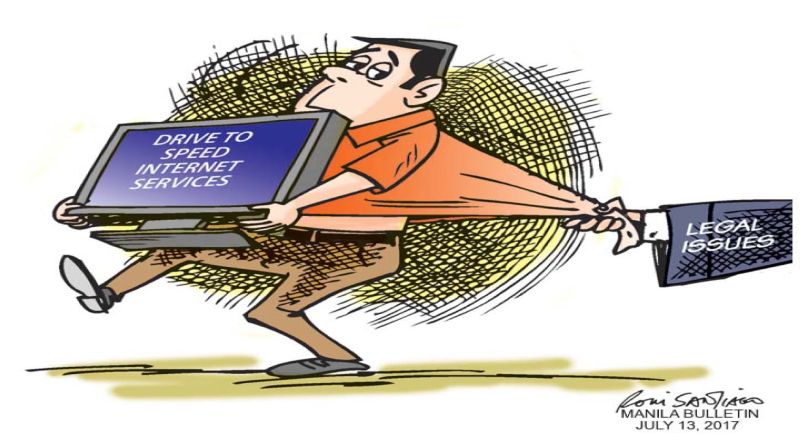Many fronts in drive to speed Internet services
An all-out drive to improve the nation’s online connectivity via Internet is underway on several fronts.
In Congress, a bill has been filed by Makati Rep. Luis Campos Jr. that would compel Philippine telecommunication service providers to improve their networks and services, including scaling up their connection speeds within prescribed deadlines. The bill cites the usual dismaying statistics: The Philippines has the slowest Internet speed in Asia-Pacific at 5.5 megabits per second (mbps), compared to Thailand’s 16 mbps, Vietnam’s 9.5 mbps, Malaysia’s 8.9 mbps, and Indonesia’s 7.2 mbps. The world’ fastest is South Korea’s 28.6 mbps.
The nation’s two telecom companies —Globe and Smart – have ambitious plans to improve their services nationwide, but they face a bureaucratic maze created by some local government units (LGUs). At the recent launching of One Digital Nation in Makati, Globe Telecom President and CEO Ernest Cu said his company has a $750-million plan for network modernization, including fiber optic wires to 20,000 barangays, but it faces difficulty getting LGU approval.
Then there are judicial cases that have effectively stopped the implementation of telecom plans to improve their services. A civil suit is now pending in the Makati Regional Trial Court filed by Globe against a village resident spreading claims about the health risks of a planned cell site in the community. The telecom firm said the power density levels of its planned network of small cell sites using Outdoor Distributed Antennas (ODAs) do not exceed the limits set by the Center for Device Regulation, Radiation Health, and Research. Its efforts to improve services using specialized fiberoptic links are now pending implementation in Dasmarinas Village because of the court case.
The biggest court case is the one now before the Supreme Court. Over a year ago, Philippine Long Distance Telephone Co. and Globe Telecom acquired a 700-megaherz frequency from San Miguel Corp. and they vowed to make considerable improvements in their services within a year. The Philippine Competitive Commission (PCC), however, stepped in to question the agreement already approved by the National Telecommunications Commission (NTC). It lost its bid for a preliminary injunction in the Court of Appeals, but it immediately appealed to the Supreme Court. There the matter rests to this day.
Thus on so many fronts, there are efforts to improve the country’s Internet speed – in Congress where a bill has been filed to push the telecom firms, in local governments to speed up the issuance of permits needed to erect cell sites, in local courts where local residents raise health issues, and in the Supreme Court which we hope will soon act to resolve a dispute between two government agencies that has stopped a major project to improve the country’s Internet services.
On all these fronts, we hope to see progress soon in efforts to raise the country from its present low position in the Internet world.












